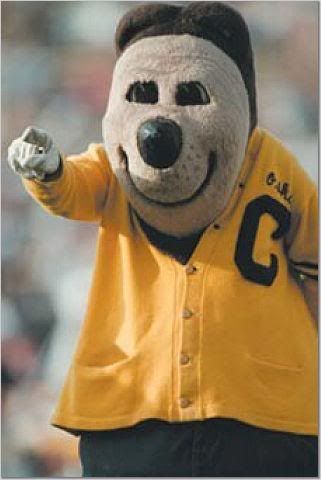THE SWEET SIXTEEN - #12 - GEORGE DIXON
#12 - GEORGE DIXON - GUARD (1925-1927)Who? Just the only two-time first team All-American in school history, that's who. Dixon was a guard and captain for the Bears who led the team to undefeated records in both 1926 and 1927. The basketball of that era would be barely recognizable today. In 1926 the Cal team averaged fewer points per game than the football team did this year. They beat UCLA 21-8, and St. Mary's 27-12.
Dixon was a big, physical guard who was named the top guard in the Pacific Coast Conference after his junior and senior years. After both seasons Dixon and his mates faced Oregon in a two out of three tournament for PCC conference supremacy. Cal won all four games, by an average of ten points. Dixon was the first Golden Bear to be named to an All-America squad, earning the honors from the Helms Foundation in both '26 and '27.
One wonders whether California might have contended for national championships during Dixon's era, but sadly he came along much too early for the NIT or NCAA tournaments, which started in 1938 and 1939, respectively. Dixon's worth to the Cal team was proven out in 1928, the year after his graduation, when Cal slipped to a 9-6 record.
Dixon's reputation for hard-nosed play is supported by his decorated rugby career. In his sophomore year, he was a member of the 1924 US Olympic rugby team, which traveled to Paris to compete in a three-team tournament with Romania and the favored host country. The US had won the gold medal in the 1920 Antwerp Games behind a half-dozen Cal stars, but the French team were 20-1 favorites to win the gold on home soil in '24. The majority of American players this time around were football and basketball players from Stanford and Cal who had only been playing rugby for six months. We'll turn it over to the Rugby Football History website from here:
"If these young American athletes expected to be welcomed to France with kisses on both cheeks, they were unpleasantly surprised. The team was the target of hostility even before the players set foot on French soil. French journalists branded them "streetfighters and saloon brawlers" after a brouhaha in the port of Boulogne where immigration officials mistakenly refused the team entry, and the players - many of whom had been seasick during the turbulent crossing - forced their way off the ship onto dry land.Dixon and the rest of the ragtag bunch of Bay Area athletes kicked the favored French all over the pitch and won a 17-3 upset and the gold medal. The crowd of 40,000 Frenchmen had to be restrained by les gendarmes from attacking the upstart Americans, who couldn't hear the Star Spangled Banner through the booing and catcalls.The American rugby players' reputation only deteriorated. When Paris authorities cancelled previously arranged games against local club teams and restricted American workouts to a patch of scrub land next to their hotel, the players responded by marching down to Colombes Stadium, scaling the fence, and going through their paces on the hallowed turf.
"It wasn't the best way to conduct international affairs," concedes Norman Cleaveland, chuckling at the memory. "If they wanted to push us around," snarls 91-year-old Charlie Doe, who was vice-captain of the 1924 team, "then we damn well pushed back."
Would make a great movie, no?



1 Comments:
I was looking for something like that, thanks
Post a Comment
<< Home